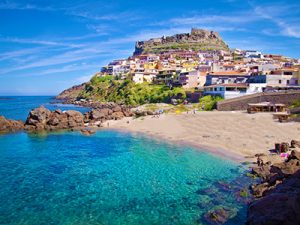
Due south of the French island of Corsica, the Italian island of Sardinia has a lot in common with its Francophone neighbor. Both are mountainous, both have beaches aplenty, and both tend to get overshadowed by their respective mainlands by travelers. Hmph.
As with peninsular Italy, Sardinia is amazingly varied. So much so, in fact, that you can personalize a trip depending on what does it for you. Being the capital and largest point of entry, there is a very good chance you will at least pass through Cagliari, on the southern end. You’ll know when you get there when you spot the flamingos; sunny Sardinia is one that bird’s most northern reaches.
Very much a modern town, but with a history going back 5,000 years, past the Romans, Greeks, and Phoenicians straight into the Neolithic, Cagliari sets the pace. Of course, in this neck of the woods, ancient history abounds; Olbia, in the north, pushes its Greek heritage as much as it does its world-famous beaches along the glitzy Costa Smerelda (billed as the most expensive destination in Europe). Oristano is famous for its wine, Vernaccia di Oristano, and what is perhaps the most unappetizing cheese you have ever experienced. It’s called casu marzu, it’s made from sheep’s milk, and, for all intents and purposes, it’s rotten. It comes with maggots — which, swear to God, you are supposed to eat along with the cheese, which smells like death. But hey, it’s an aphrodisiac! Or so they say…
On that note, if lusty island boys are on your to-do list, you will eventually find yourself back in Cagliari. Like Corsica, the gay pickings on the island are slim, largely because the place just isn’t that big (and, to be honest, Sardinia could to a little better at marketing itself, but that’s just my opinion). Keeping all that in mind, Go Fish is the gay club to hit, while Rainbow is the bar. When the summer season hits, two other gay bars come onto the radar: Fico d’India and Chiringuito. There are also two gay beaches, Cala Mosca and Mari Pintau.
By the way, if all these names sound a little less like the Italian you are used to, there is good reason — Sardinia has its own language, Sardo. It’s in the Italian family, but with really heavy doses of Arabic, Catalan, and Spanish to make it it’s on thing.
Ready to check it out for yourself? Contact Steele Travel at info@steeletravel.com or 646.688.2274 to start planning your trip today.
